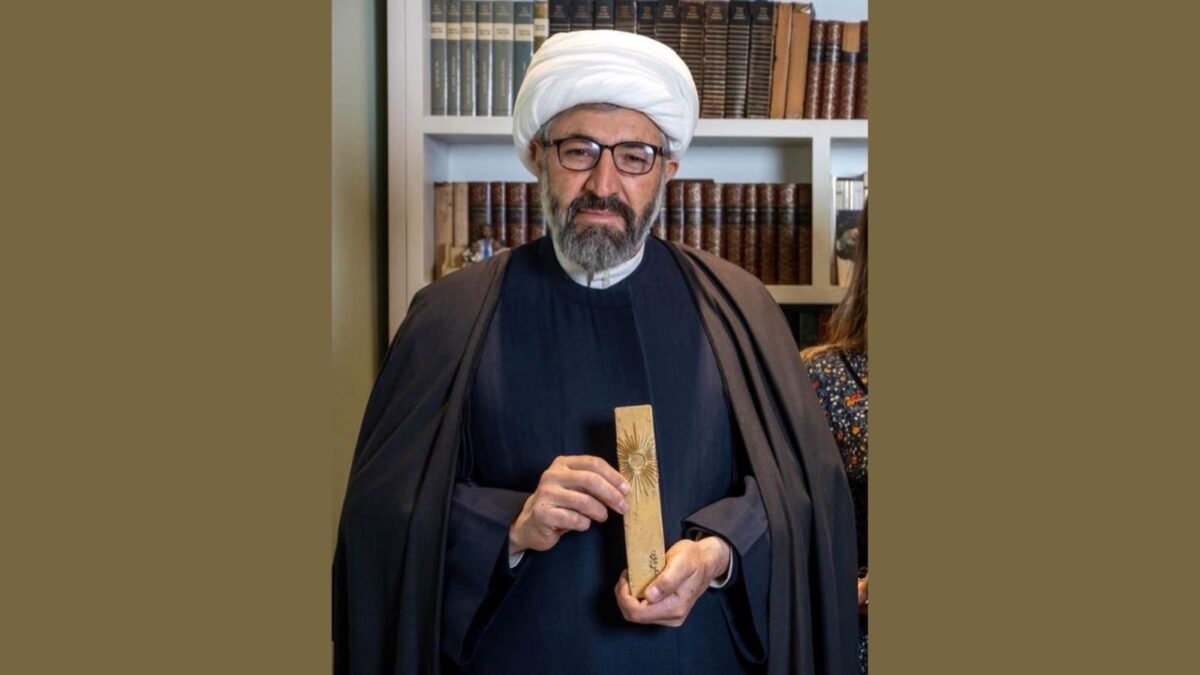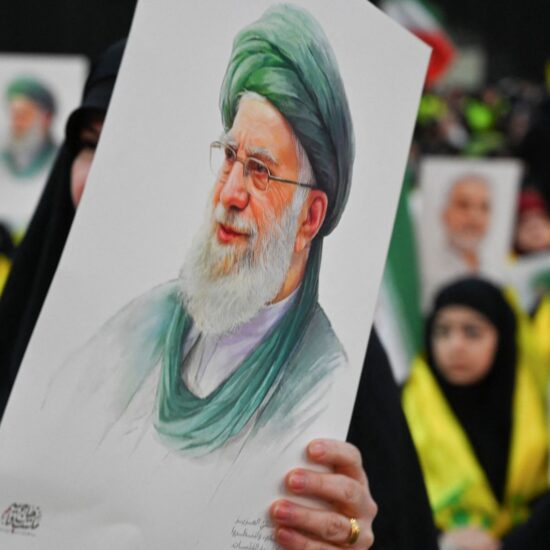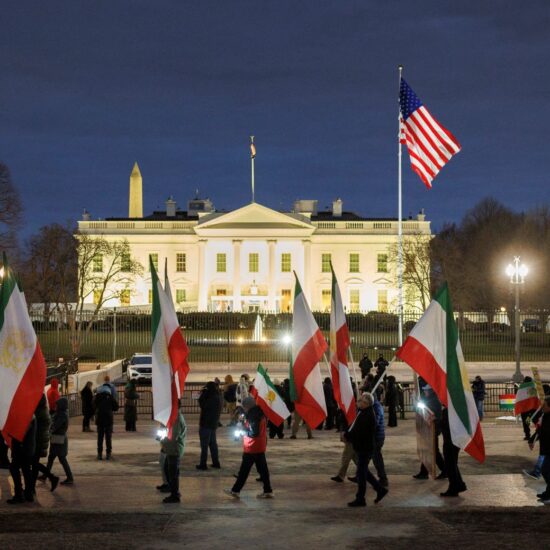
Shiite cleric Abbas Yazbek, a vocal Hezbollah critic, says General Security questioned him days after his Beirut Airport detention over his link to a Facebook group critical of the party and its allies
Lebanese cleric Sheikh Abbas Yazbek was stopped by General Security officers at Beirut’s Rafik Hariri International Airport while attempting to travel to France with his wife. Acting on a judicial order issued by Judge Assad Bayram, officers prevented him from boarding his flight, confiscated his identification papers and phone, and instructed him to report to the security agency within four days. The incident caused him to miss his scheduled trip.
Yazbek, imam of the town of Nahleh in Baalbek and a philosophy teacher at a public high school, is known for his longstanding criticism of Hezbollah. He questioned the legality of the measure, noting he held all proper documents and had no outstanding charges. “I am under the law, an employee of the state, and a teacher. If I were wanted, how could I perform my job?” he said, describing the treatment he received as “aggressive.”
Yazbek linked the incident to what he called “systematic political pressure” against Shiite voices opposed to Hezbollah, arguing it reflects the influence of the party within state institutions. He recalled earlier threats and assaults he says he faced from Hezbollah members, including an armed incident at the school where he teaches, and likened his airport experience to those encounters.
Supportive groups, including the “Lebanese Shiite Gathering” and the “Coalition of Lebanese Democrats,” condemned what they described as an “arbitrary and humiliating” act. They accused security institutions of serving as tools for political intimidation and called on Prime Minister Nawaf Salam, President of the Republic, and the judiciary to intervene, investigate the circumstances of the detention, and protect citizens from politically motivated actions.
The Global Assembly of Free Scholars also condemned the summons of Sheikh Abbas Yazbek as arbitrary and politically motivated, calling it a violation of Lebanese law and international human rights. They urged the international community and human rights organizations to protect freedom of opinion in Lebanon and affirmed their commitment to peacefully defending independent voices.
Lebanese Forces leader Samir Geagea called the incident a continuation of “police-state practices” by General Security despite a government directive to end such measures. He questioned the legal basis for preventing Yazbek’s travel and accused the agency of political retaliation against opposition figures. Geagea urged the Prime Minister and relevant ministers to investigate and halt these practices immediately.
A few months ago, Prime Minister Nawaf Salam urged the security services and armed forces to immediately cancel all wanted notices and watch lists not backed by judicial rulings — effectively scrapping the so-called “blacklists” of individuals.
In contrast, security sources attributed the measure to an order from the military prosecutor accusing Yazbek of “collaboration” following a complaint. Officials said he was not under arrest, but required to follow up with the relevant authorities.
The timing has drawn additional scrutiny, coming shortly after the government ordered the cancellation of so-called “contact documents” that previously allowed security agencies to restrict movement without judicial oversight.
Nothing New
Sheikh Abbas Yazbek has previously reported facing direct threats and assaults linked to his opposition to Hezbollah. In one incident at the public high school where he teaches philosophy, he said two men confronted him inside the teachers’ lounge, one identifying himself as a Hezbollah security official. According to Yazbek, the exchange escalated into verbal abuse and death threats, with one of the men’s bodyguards pointing a gun at him and other staff members before leaving the premises.
Yazbek said he attempted to file a complaint with authorities but was turned away after police learned the dispute involved Hezbollah members. He added that this was not the first time he had been targeted. In 2014, he alleged that he was assaulted at one of the group’s checkpoints, and in 2019, before the October 17 uprising, he says he was threatened again for supporting the protests.
For Yazbek, these incidents are tied not to personal disputes but to his political stance as a cleric openly critical of Hezbollah.
However, Sheikh Yazbek has remained active, and in August of this year, he visited Maronite Patriarch Cardinal Bechara Boutros al-Rahi at the summer patriarchal residence in Deimant. Accompanied by Dr. Hadi Murad and a Shiite delegation from Baalbek-Hermel, Yazbek discussed the situation in southern Lebanon and requested the Patriarch’s support to help families in the region, particularly in ensuring children’s access to education in local private schools after years of difficult circumstances.
He also emphasized national unity, recalling how Lebanese communities came together during past conflicts, and called for efforts to build a Lebanon that protects all citizens, respects state institutions, and fosters coexistence across sectarian lines.
Following the airport incident, the Sheikh participated in a political meeting in Nahleh, Baalbek, called “For the State,” alongside other local leaders. The meeting issued a statement affirming the importance of a strong, capable, and just Lebanese state as the path to stability and development. Yazbek and the other participants emphasized that resistance should be limited to ending occupation, that Lebanon must maintain strong ties with the Arab world and the international community, and that sectarian exclusion must be avoided. The statement also warned that ignoring the state’s exclusive authority over arms would leave southern Lebanon vulnerable to renewed cycles of violence.
In response to his summons for questioning, several civil and political activists, as well as media and cultural figures, held a solidarity protest outside the Lebanese General Security building in the Museum district on Tuesday. Among those present were Ali Al-Amin, editor-in-chief of the Southia website; Mohammad Barakat, managing editor of Asas Media; journalist Jad Al-Akhoui; political activists Dr. Hadi Murad, Dr. Ali Khalifa, and Nidal Abu Shaheen; publisher and writer Rasha Al-Amir; and researcher Hanaa Jaber, along with other activists.
What Happens Now
Sheikh Abbas Yzbk described what happened as “a practice by some General Security officers that resembled militia behavior.” He told NOW he was prevented from traveling “without any legal basis” and believes the decision had “a double purpose — to stop me from leaving the country and to tarnish my image within my own community.”
He called this a form of “moral assassination,” explaining that “through rumors and illusions they try to create a false image of me” despite his role as a sheikh and public intellectual.
Sheikh Abbas linked the incident to a long history of political targeting. He recalled leading an electoral list against Hezbollah in Baalbek-Hermel in 2000, surviving “armed attacks” and “suspicious assassination attempts,” and opposing Hezbollah’s intervention in Syria and its crackdown on Lebanon’s 2019 uprising. “This is not an isolated event,” he said. “It’s part of an ongoing confrontation.”
He rejected claims about his online activity being grounds for investigation, saying he only belongs to public Facebook groups and “none of this justifies a travel ban or military court referral.” He added that the incident could be seen as a message to the Shiite opposition, warning that persistent dissent may carry real-life consequences. While the travel ban against him has since been lifted, the sheikh noted, “There are no guarantees in this country.”
Sheikh Abbas said he wants accountability and protection from the state, in addition to an official apology.
“We hoped for better performance from this government. If there are officials who still believe in the state, they must act,” he said.
Journalist and political commentator Ali al-Amin described the incident as a deliberate show of force by Hezbollah. “They want to tell their base: ‘We are still strong,’” he said, noting that while the group may be constrained in its dealings with Israel, it asserts dominance internally through such measures.
He argued that Sheikh Abbas Yazbek’s case reflected political intimidation more than legal procedure. By blocking his travel and questioning him without solid grounds, al-Amin said, Hezbollah was sending a message that it can “stop anyone, for any reason.”
Al-Amin added that the state’s credibility is at stake. “The state must not appear dependent; there must be transparency and accountability,” he stressed, calling for an apology, compensation, and safeguards to ensure such incidents are not repeated against other dissidents.
The treatment of Sheikh Abbas Yazbek underscores how Lebanon’s security apparatus remains vulnerable to political interference, raising doubts about promised reforms. As journalist Ali al-Amin notes, the incident appeared more like a message of control than a matter of law. For Yazbek, the ban may have been lifted, but the absence of safeguards means “there are no guarantees in this country.” Whether the new government can curb such practices will be a key test of its credibility — and of Lebanon’s ability to protect dissent.







